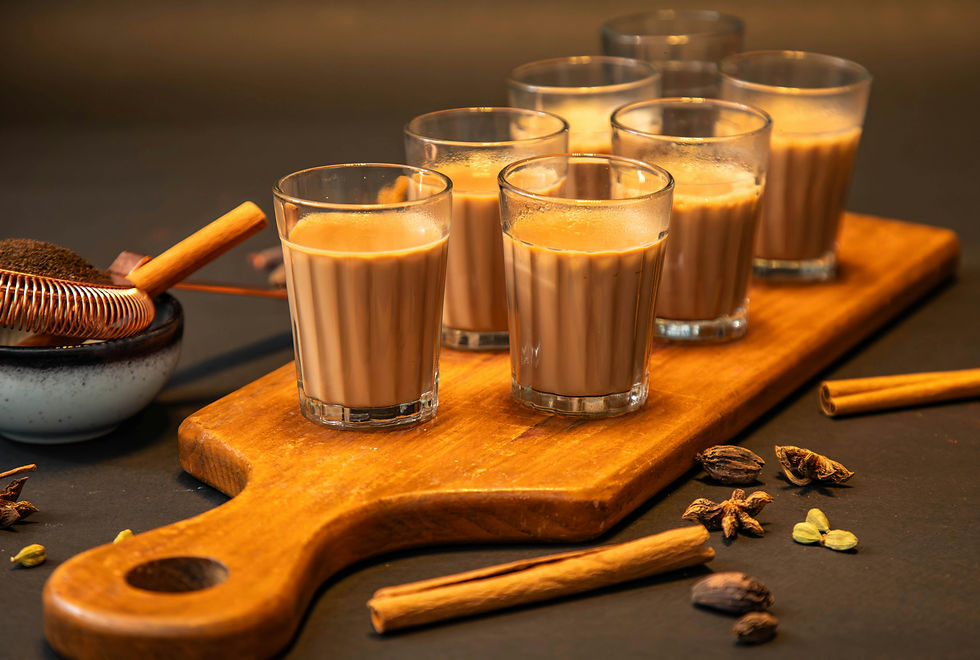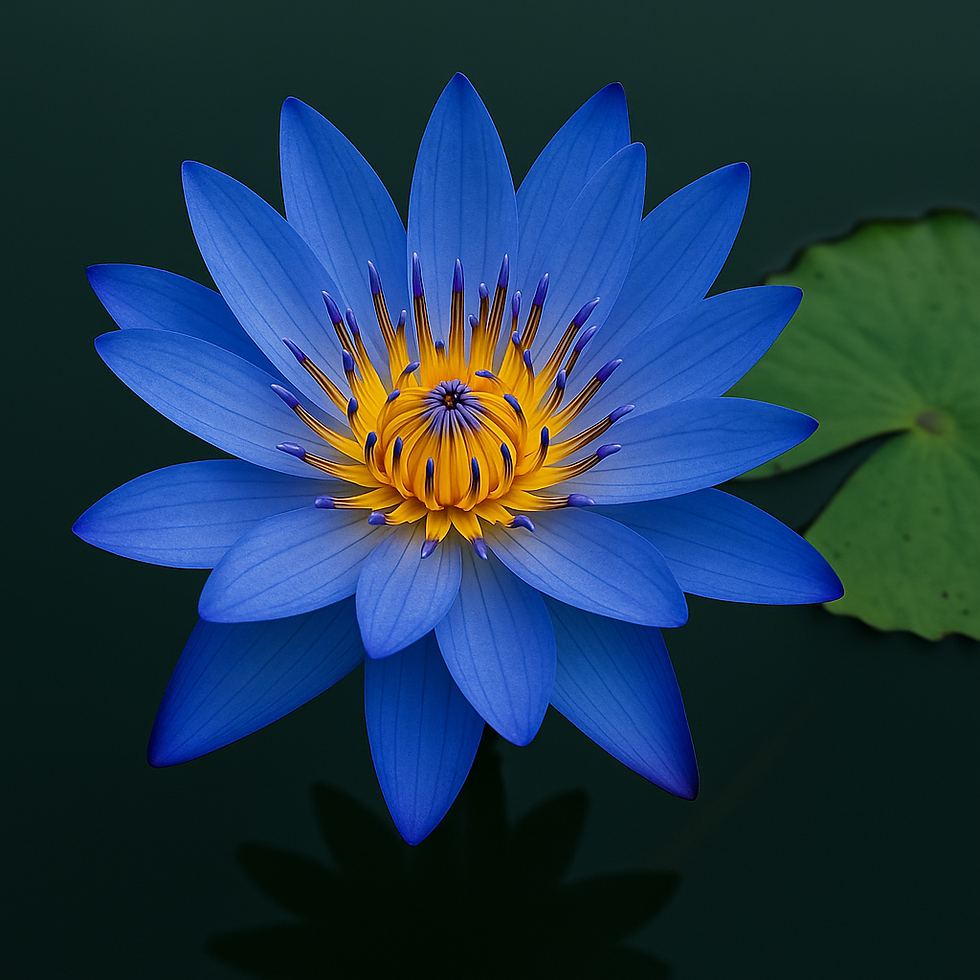5 Trending Herbal Teas for Hormonal Wellness Loved Worldwide
- cyclewhispereroffi
- 1 day ago
- 8 min read

Tea is more than a drink. It is a tradition, a remedy, and a quiet moment of care found in cultures worldwide. In Kenya, a steaming cup of dawa (ginger tea) is a go-to comfort during the cold season. In Thailand, blue lotus is treasured for its calming properties. In Qatar, saffron threads are added to tea for their golden hue and mood-lifting aroma. These global traditions are more than beautiful rituals; many are backed by science for their role in supporting hormonal health.
Whether you are sipping hibiscus in the UK on a rainy afternoon, brewing tulsi in Singapore to melt away the day’s stress, or trying a maca-infused latte in a trendy wellness café, each cup carries centuries of wisdom and modern benefits for menstrual, PMS, and menopause support. This is your passport to five of 2025’s most talked-about tea ingredients and how they can help you feel more in sync with your cycle:
1. Blue Lotus In Thai tradition, blue lotus has been used for centuries in temple offerings and calming teas. Known as “the dreamer’s tea,” it’s said to promote deep relaxation and restful sleep, offering gentle support for better hormonal balance during your cycle.

2. Tulsi (Holy Basil) Often called the “Queen of Herbs” in Ayurveda, tulsi is a beloved adaptogen across India and Southeast Asia. It’s widely enjoyed in Singapore as a daily brew for stress support, helping regulate cortisol levels that can disrupt hormonal health.

3. Hibiscus In Kenya, hibiscus, often known as “roselle,” is steeped into a bright crimson tea enjoyed hot or cold. Its tangy flavor is more than refreshing; hibiscus contains phytoestrogens that may support estrogen balance and menstrual comfort.

4. Saffron Across the Middle East, saffron is prized for its golden hue and uplifting aroma, often infused into tea during special occasions. Research now shows saffron may help ease PMS symptoms like irritability and low mood, adding modern science to ancient tradition.

5. Maca, Native to the Andes, maca root is traditionally consumed to boost stamina and vitality. Today, it’s making its way into global wellness tea blends, valued for its potential to support energy and hormonal balance without the spikes and crashes of caffeine.

Understanding Hormonal Wellness
Hormonal wellness is a critical aspect of overall health, particularly for individuals who experience menstrual cycles. Hormones act as chemical messengers, regulating metabolism, mood, reproductive processes, and even sleep. When these hormones are in balance, the body operates smoothly. But when imbalances occur, symptoms such as fatigue, mood swings, irregular cycles, and sleep disturbances can follow.
A balanced endocrine system depends on harmony between estrogen, progesterone, and testosterone. Stress, diet, environmental toxins, and lifestyle changes can disrupt this delicate equilibrium. Natural life stages such as puberty, pregnancy, perimenopause, and menopause also shift hormone levels.
Herbal teas offer a time-tested way to support this balance. Used across cultures for centuries, they can gently assist the body in regulating hormone production, reducing inflammation, and supporting the liver’s role in hormone metabolism.
The Role of Herbal Teas in Hormonal Balance
Herbal teas can influence hormonal health in three main ways:
Adaptogenic Support - Herbs like tulsi (holy basil), popular in both Ayurvedic traditions and modern wellness cafés in the UK and Singapore, help the body adapt to stress, reducing cortisol spikes that can disrupt hormonal balance.
Anti-inflammatory and Circulatory Benefits - Ingredients like hibiscus, beloved in Kenyan coastal infusions and Thai iced teas, support healthy circulation and reduce inflammation, which can ease menstrual discomfort.
Mood and Sleep Regulation - Blue lotus, historically used in Egyptian and Southeast Asian teas, promotes relaxation, supports deeper sleep, and can help soothe anxiety linked to hormonal shifts.
By integrating these teas into daily life, you can support hormonal harmony in a natural, culturally rich way.
Top Herbal Teas for Menstrual Health

Menstrual health is a significant aspect of a woman's well-being, and herbal teas can play a vital role in supporting a healthy menstrual cycle. Certain herbal teas have been traditionally used to alleviate menstrual discomfort, regulate periods, and support overall reproductive health:
Hibiscus - Packed with antioxidants, hibiscus tea helps regulate blood pressure, supports heart health, and may balance estrogen levels. In hot climates like Singapore and Thailand, it is often enjoyed iced. In the UK or Kenya’s highlands, it is served warm with spices.
Tulsi (Holy Basil) - Known for its adaptogenic qualities, tulsi helps regulate cortisol and supports reproductive health. It is a staple in South Asian households and is now trending in UK wellness cafés.
Maca - This Peruvian root, now trending globally, helps boost energy, stamina, and libido while supporting hormonal balance. It is delicious blended into lattes in Nairobi cafés or warm tonic teas in London’s winter months.
How Herbal Teas Can Alleviate PMS Symptoms
Premenstrual syndrome (PMS) can cause a range of physical and emotional symptoms that can significantly impact daily life. Herbal teas offer a natural and effective way to alleviate these symptoms and promote a sense of well-being.

These are a few standout ingredients making waves in 2025 for their ability to ease PMS symptoms:
Saffron - Popular in Middle Eastern and Qatari tea traditions, saffron is known for its mood-enhancing effects and can help ease irritability, anxiety, and depressive symptoms during PMS.
Blue Lotus - A gentle sedative, blue lotus can reduce muscle tension and promote better sleep during PMS. It is a beautiful evening tea option in any region, often combined with honey or floral blends.
Herbal Teas to Support Menopause

Menopause marks a significant transition in a woman's life and can bring about various symptoms due to hormonal changes. Herbal teas can offer natural support to ease this transition and alleviate menopausal symptoms. Across regions from Qatar to Kenya and Thailand, these herbal ingredients are valued for their role in easing menopause discomfort:
Saffron - Reduces hot flashes and improves mood stability.
Hibiscus - Supports cardiovascular health, which becomes especially important in postmenopausal years.
Maca - Helps with energy, libido, and overall vitality, making it popular with wellness-conscious women in urban hubs from Nairobi to Bangkok.
The Science Behind Herbal Ingredients
Tulsi - Adaptogen shown to reduce cortisol and support reproductive hormones.
Hibiscus - Contains phytoestrogens and polyphenols that may influence estrogen balance.
Saffron - Studies show improvements in mood and PMS symptoms with saffron supplementation.
Blue Lotus - Contains aporphine, which can promote relaxation and sleep quality.
Maca - Supports endocrine function and has been linked to improved sexual health and mood in clinical trials.
How to Brew the Perfect Cup of Herbal Tea
Brewing the perfect cup of herbal tea requires attention to detail to ensure that the beneficial properties of the herbs are fully extracted. Start by selecting high-quality, organic herbs to avoid exposure to pesticides and other harmful chemicals. Measure the appropriate amount of herbs, typically one to two teaspoons per cup of water, depending on the strength desired.
Boil fresh, filtered water and pour it over the herbs in a teapot or infuser. Cover the pot to prevent the essential oils from escaping and let the tea steep for 5 to 10 minutes. The steeping time can vary based on the type of herb and personal preference. For stronger flavors and more potent effects, a longer steeping time may be necessary.
Once the tea has steeped, strain the herbs and pour the tea into a cup. Enjoy the tea hot or allow it to cool and serve over ice for a refreshing beverage. To enhance the flavor, consider adding natural sweeteners like honey or agave, or a splash of lemon juice. Brewing herbal tea with care ensures that you receive the maximum benefits from each soothing cup.
Here is my recommendation on a regional basis:
UK - Warm tulsi or hibiscus infusions in a teapot, served with a slice of lemon.
Singapore and Thailand - Hibiscus or blue lotus iced teas with citrus.
Qatar - Saffron-infused black or green tea, often served sweetened.
Kenya - Hibiscus blended with spices in a chai-style brew.
Potential Side Effects and Considerations
While herbal teas offer numerous benefits, it is essential to be aware of potential side effects and considerations. For example:
Hibiscus - May lower blood pressure; avoid in early pregnancy.
Saffron - High doses can cause dizziness or nausea; avoid excess.
Maca - May affect thyroid function in sensitive individuals.
Some herbs can interact with medications or have contraindications for certain health conditions. It is crucial to consult with a healthcare provider before incorporating herbal teas into your routine, especially if you have existing health conditions or are taking medications.
Additionally, some herbs can cause allergic reactions or sensitivities in certain individuals. Symptoms of an allergic reaction can include itching, rash, and gastrointestinal discomfort. Start with small amounts of a new herb to assess your tolerance and watch for any adverse reactions. It is also important to source herbs from reputable suppliers to ensure their quality and purity.
Pregnant and breastfeeding women should exercise caution when using herbal teas. Always seek guidance from a healthcare provider before consuming herbal teas during pregnancy and breastfeeding. By being mindful of these considerations, you can safely enjoy the benefits of herbal teas for hormonal wellness.
Integrating Herbal Teas into Your Daily Routine
Incorporating herbal teas into your daily routine can be a delightful and beneficial practice for hormonal wellness. Start by identifying the specific herbs that address your individual needs, whether you are seeking relief from menstrual discomfort, PMS symptoms, or menopausal challenges. Consider creating a tea schedule that aligns with your hormonal cycle:
Follicular Phase - Tulsi for energy and hormone regulation.
Ovulatory Phase - Hibiscus for circulation and heart health.
Luteal Phase - Saffron for mood and PMS relief.
Menstrual Phase - Blue lotus for relaxation and sleep. I also recommend cranberry juice, as it helps with menstrual relief, as discussed in my article here.
Creating a ritual around tea time can enhance the experience and provide a moment of relaxation and self-care. Set aside time each day to brew and enjoy your herbal tea, free from distractions. This practice can help reduce stress and promote a sense of well-being. Additionally, experiment with different herbs and blends to discover your favorite flavors and combinations.
Consider integrating herbal teas into other aspects of your routine, such as using them in cooking or incorporating them into skincare. By finding creative ways to incorporate herbal teas into your daily life, you can fully embrace their benefits and support your hormonal wellness journey.

Conclusion: Embrace Herbal Teas for Hormonal Harmony
Embracing the natural healing power of herbal teas can be a transformative step towards achieving hormonal harmony. These soothing brews offer a gentle yet effective way to support the endocrine system, alleviate symptoms of hormonal imbalances, and promote overall well-being. Whether you are seeking relief from menstrual discomfort, PMS symptoms, or menopausal challenges, there is an herbal tea to address your needs.
By understanding the benefits of specific herbs and incorporating them into your daily routine, you can take a proactive approach to hormonal wellness. From the calming properties of chamomile to the hormone-balancing effects of chasteberry, each herb brings unique qualities that can help you feel more in tune with your body. The science behind these herbal ingredients supports their efficacy, providing a natural and holistic solution for maintaining hormonal balance.
As you explore the world of herbal teas, remember to consider potential side effects and consult with a healthcare provider when necessary. With mindful integration and a commitment to self-care, you can enjoy the nourishing benefits of herbal teas and revitalize your cycle. Embrace this journey towards hormonal harmony, one nourishing sip at a time.




Comments